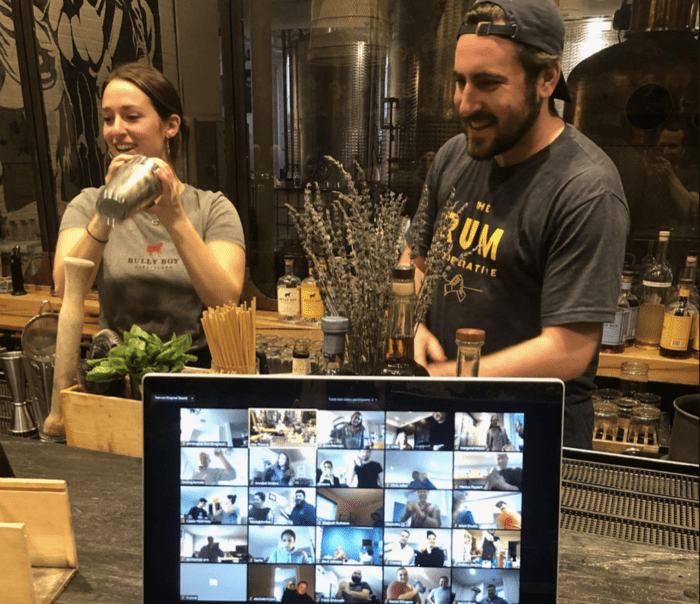
“It’s a lot of work to get together a group of people, and there’s a lot of luck involved, so we were brainstorming ideas about what we might be able to do to keep them engaged.”
With their tasting rooms closed and the state refusing to allow restaurants and bars to offer cocktails for takeout and delivery, Massachusetts distilleries are struggling to support staff and connect with customers. But a few local makers have found innovative—and safe—ways to furnish locals with drinks and behind-the-bar education.
Frustrated by the exclusion of cocktails from the April 3 bill allowing licensed restaurants to sell wine or beer for takeout and delivery, GrandTen Distilling president Matthew Nuernberger appealed to a higher power. He contacted the TTB (Alcohol and Tobacco Tax and Trade Bureau), the federal agency responsible for approving the sale of alcoholic beverages, and received approval to sell several of the most popular cocktails from GrandTen’s South Boston tasting room in 750ml bottle form.
“That’s one way that we have pivoted to get around this anti-cocktail business,” Nuernberger said. “We’re able to go a higher level than the state to be able to still service our customers some cocktails while remaining in compliance with both state, city, and federal law.”
GrandTen was required to submit the drink’s formulation and label to the TTB for approval—just as it would have done with a new gin—but these made-to-order bottled cocktails were never intended for liquor store shelves.
“It’s not an item that would ever make it onto a retail shelf in a post-pandemic world,” Nuernberger added. “It’s fresh juices, real sugars, there’s no preservatives, no artificial flavorings, so it’s not going to be able to hang out on the retail store shelf for any amount of time. … It’s a bit more like a growler that you’d pick up at a brewery.”
GrandTen is currently selling nine varieties on its website, including classics like the Bee’s Knees (Wireworks gin, lemon juice, honey) and the Daiquiri (New Medford Rum, lime juice, sugar). The cocktails are simply meant to be poured over ice and range from 12% alcohol on the lower end to 16% alcohol on the higher end. They can be ordered online and picked up at the distillery between 9 am and 5 pm on Monday through Friday, and 11 am to 6 pm on weekends.
As for the shelf-life of the project itself, Nuernberger doesn’t see it outliving the present moment.
“When life returns to normal, I don’t see the popularity still being there,” he said. “I mean, maybe it will. I view it as a short-lived, short-term solution.”
The COVID-19 pandemic hit just as Roxbury’s Bully Boy Distillers had assembled what co-owner Will Willis described as “the strongest front-of-house team we’ve had since opening our tasting room in 2017.”
“It’s a lot of work to get together a group of people, and there’s a lot of luck involved, so we were brainstorming ideas about what we might be able to do to keep them engaged,” Willis continued.
In conjunction with events manager Sophia D’Angelo and director of operations Oliver Taylor, Willis started holding virtual cocktail classes as a means of support. The hour-long sessions are led by Bully Boy bartenders who instruct up to 35 attendees on bartending basics while preparing two different cocktails (a list of necessary ingredients can be sent to attendees in advance). Aside from online transaction fees, all of the proceeds collected from the $10-a-head classes will directly benefit bar staff.
Before the pandemic, Bully Boy held cocktail classes, but never on Zoom. The first class of the new sort was slated for Friday, April 17, with a second class that Saturday. After both sold out, three more classes were added to the inaugural weekend. By the second weekend, seven classes were being held, and its third weekend saw the number increase to eight.
Ironically, Bully Boy’s virtual classes proved to be more successful than its non-socially distanced ones.
“I think a lot of it is that folks are home dying for content, but the level of interest has just been staggering,” Willis said. “Credit goes to the bar staff, too, for putting on such a good show.”
Willis added that they have experienced repeat attendees and hosted amateur mixologists from far outside their own backyard.
“People are coming in from California and all points in between [who] maybe haven’t heard of Bully Boy before, so it’s been tremendous marketing exposure as well.”
In response to the outpouring of interest, Bully Boy also started offering private cocktail classes, which allow the booker to invite their friends and request the class’s subject and drinks. They are currently offering 10 such virtual classes per week—three on Thursdays, three on Fridays, and four on Saturdays, which can be found in a schedule posted on their website and booked online.
This article was produced in collaboration with the Boston Institute for Nonprofit Journalism as part of its Pandemic Democracy Project.
HELP DIGBOSTON WEATHER THIS STORM AND CONTINUE PROVIDING ARTICLES LIKE THIS ONE
Eric Twardzik is a Boston-based writer and editor with extensive experience in branded copywriting and journalism with an emphasis on food, drink, travel and men's lifestyle.

